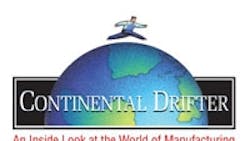The most successful U.S. export of all time is not made of steel, wood, silicon or plastic. It is not a piece of furniture, an automobile, a computer, or a Lionel choo-choo. It does not have the immediately recognizable shape of a Coca-Cola bottle, nor does it boast golden arches, mouse ears, or the proud profile of King C. Gillette on its packaging.
America's greatest export -- the one that has achieved near-universal acceptance, can be found on every continent and in virtually every country, and is used every day by people everywhere -- is not even a tangible object.
It is, in fact, a word -- or, rather, the semblance of a word.
The expression "O.K." was Made in the U.S.A. early in the 19th century, and since then it has been incorporated into nearly every language on earth. Spread worldwide by American soldiers serving overseas, by diplomats, students, tourists, newspapers, literature, film, and television, "O.K." gained currency wherever it landed. Just as it does in English, it conveys a myriad of meanings and a spectrum of emotions in almost all the tongues of Europe, Asia, Africa and South America.
Which is not to denigrate the contribution of "O.K." On the contrary, the term is compact, versatile, flexible and easy to use. Entirely utilitarian, it can be stylish as well, depending on the circumstance of its application. And it can be employed by young and old, men and women, rich and poor.
"O.K." works as well orally as in written form. It can mean "All right," "As you wish," "I understand," "That's fine," and scores of other connotations. And although it has many uses in each language in which it appears, it is immediately understandable within its context. No one ever has to think twice to figure out what you're getting at when you say "O.K.", whether you say it in Louisville, Lagos, Lille or Lhassa.
It is, in other words, exactly what the best manufactured product aspires to be -- adoptable by everyone; adaptable to numerous locales and disparate requirements; and, once accepted, so much a part of people's lives that they can't remember how they ever managed without it.
All of which raises the question: Why are so few manufactured goods as widely popular as this simple, semi-literate expression? Is there a lesson to be learned from the ubiquity of a humble phrase like "O.K."?
Could it be that "O.K." has been so successful over so long a period because it does something that fewer and fewer manufactured goods seem to do anymore; i.e., work simply, conveniently, reliably, perfectly?
It's a thought to consider the next time you look at your sales numbers and realize they are something less than "O.K."
